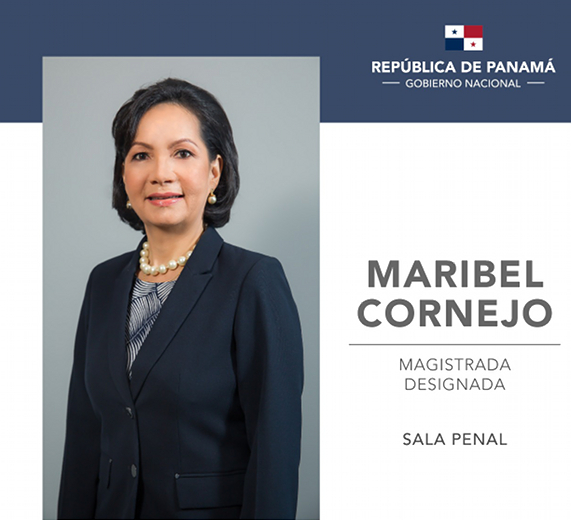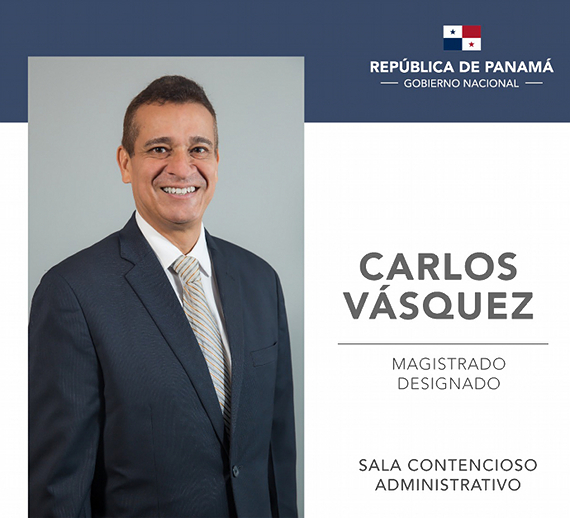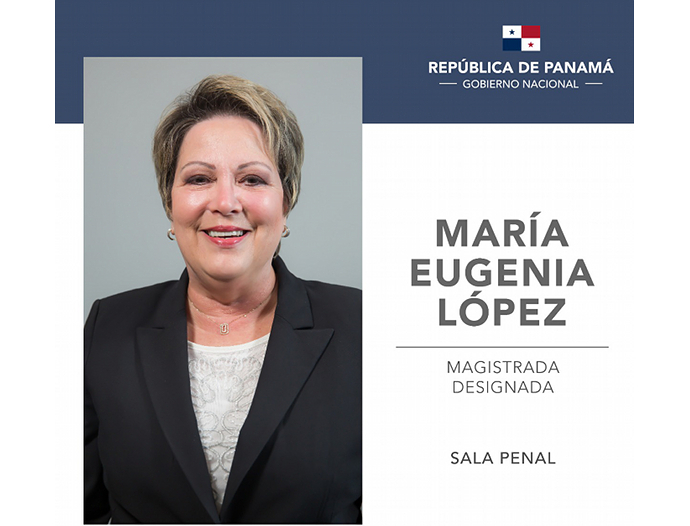María Eugenia López Arias is a 29-year veteran of the court system with undergraduate and master’s law degrees from the University of Panama and postgraduate seminars on a wide variety of subjects in Panama, Spain, Mexico and Colombia. Nominated to the Penal Bench, she was a trial court judge in Panama City’s 12th Penal Court, then a criminal appeals court alternate and magistrate. She would replace Jerónimo Mejía, who was appointed as magistrate by a PRD president, Martín Torrijos, and has been holding on after an expired term for want of a ratified replacement.
President nominates one-third of Supreme Court magistrates and two-thirds of the alternates
by Eric Jackson
The first part of the Varela term featured the criminal conviction of one high court magistrate on charges of amassing inexplicable wealth while on the bench and the forced departure of another who was accused of pedophile offenses and other misconduct. The convicted criminal was not replaced with a new nominee but rather his suplente was allowed to step in as acting magistrate without an alternate of his own. By the latter part of the Varela years the legislative and executive branches were at war and presidential appointments usually became dead letters without much chance of being ratified. That applied to both well qualified appointees and embarrassing political or relative of someone nominees.
So earlier this year Nito Cortizo came to the presidency with not only the usual vacancies that would come up as 2019 ends, but a collection of slots that are being filled by holdovers whose would-be replacements did not get ratified and some unfilled spots that have left the court short-handed for momentous and mostly sordid decisions. A series of ugly revelations over many years has mostly not brought any reform to the Panamanian judiciary, but rather even more widespread disrepute than before.
On Monday, November 25, a special legislative session began and Cortizo announced the centerpiece of the business at hand, the nominations of people to fill three of the high court’s nine principal magistrate seats and six of the nine alternate spots. As alternates often take part in the court’s decisions, it means a sudden change of half the faces on the court. That is, if the National Assembly will approve.

Maribel Cornejo Batista, nominated to the penal bench, has been a defense attorney in private practice for a little more than a decade. Before that she was a prosecutor for 13 years, starting out handing stolen car cases, moving up to bank and credit card fraud offenses and finally rising to senior anti-corruption prosecutor. In the early 90s she clerked for a magistrate on the Supreme Court’s Penal Bench and before that was a penal trial court reporter and a juvenile court secretary. She has her undergraduate degree in law from the University of Panama and masters degrees from that school and from USMA. She has been on various commissions that have shaped some of Panama’s laws on financial crimes. She would replace Harry Díaz, a Ricardo Martinelli appointee if not one to support and excuse the ex-president from the bench, whose term expires at the end of this year.
Looking at the three magistrate appointees and the six people who were nominated to be suplentes, it’s a mostly white or light-skinned cholo crowd, largely people brought up in the Interior and including several whose professional lives have mostly taken place there, all with Spanish surnames on both paternal and maternal sides. In Panama, as in most of Latin America, the question of who is of which race is never so clear-cut and is not one of the questions asked in our national censuses. But that said, there appear to be no Afro-descended, indigenous or Asian nominees. Several of Cortizo’s nominees have government service careers that began under the dictatorship and several were appointed to things by PRD presidents or the long-time and disgraced former PRD rector of the University of Panama. Even with the rise of would-be social cleansers in Cortizo’s party, his slate of nominees would at first glance be hard for any of the PRD caucus to oppose.
The main question for the deputies, however, and by usual practices that one that is unlikely to be directly asked of the nominees, is how indulgent they will be of legislators’ corruption. Will they continue the high court’s historic non-aggression pact in which ordinarily magistrates don’t convict deputies and deputies don’t convict magistrates? Are they blackmailable to go along? Are they known to do the bidding of any of the powerful families behind some of the legislators or their parties? In another country the nominees’ records in offices and life would be gone over with figurative fine tooth combs, but here the tradition is that members of the National Assembly hardly ever do their homework and hire friends and relatives incapable of these sorts of investigations as their aides. The opacity of court and public records hinders journalists from doing that work instead.
Cortizo took into account the suggestions and criticisms of selected civil society organizations in screening the many applicants for high court posts. He also hired Los Angeles based management consulting firm Korn Ferry to do background checks, psychological testing and other screens on the hopefuls. The screening also looked into the would-be magistrates’ families.

Carlos Alberto Vásquez Reyes, nominated to replace Abel Zamorano on the Administrative Bench, is the former two-term president of Panama’s principal bar association, the Colegio Nacional de Abogados. Between 2007 and 2010 he worked in the national ombudsman’s office (Defensoria del Pueblo), as secretary general and standing in for the boss. Most of his legal career has been in private practice and academia. He currently teaches law at Panama’s Catholic university, the Universidad Santa María La Antigua (USMA).
Because of the impasse between Juan Carlos Varela and the National Assembly, over the past few years suplentes and magistrates who were holding over from expired terms until replacements were ratified played outsized roles in high-profile cases. The impression left by that period has been of politicized, squabbling, corrupt and ineffective judicial leadership.
Perhaps the worst parts of it were that as the accusatory penal system was put into place the civil service selection process contemplated in the law was ditched in favor of rather crass favoritism, and that as the municipal corregidores were replaced with justices of the peace many of those posts went unfilled. The Supreme Court exercises broad supervisory powers over all lower courts and might, if it sees fit, have a lot of damage to repair. If the judiciary’s staffing messes are to be cleaned up, a lot of that job might be assigned to suplentes.
(Let’s not, however, look at the high-profile corruption cases that have been handled in ways to incite public scorn as generally indicative of the lower courts. For a long time a general rule of thumb is that the lower down the judicial hierarchy, the more honest the judging is. It’s the high court itself that has been the principal emporium for outrageous behavior. Notice that Cortizo’s appointees have largely been from outside of that rarefied and suspect environment.)
Choose your political spin, or mix and match, maybe taking into account what other spinmeisters have to say. The appointment of two-thirds of the suplentes, along with a third of the magistrates in principal, will radically change the face of the court and may isolate the practitioners of the games that so annoy the public at large. But it might also mean just the same, with a more PRD orientation
The suplente (alternate) nominees include:
– Carmen Luz De Gracia Jurado, who got her start in the Public Ministry in Omar Torrijos times, was a civil judge and then a labor court judge in Noriega times, and after the invasion was a penal judge and then an appeals magistrate in Panama City’s Third Circuit. She’s appointed to be the Civil Bench alternate for Angela Russo.
– Juan Francisco Castillo Canto, a 36-year legal system vet, back to the dictatorship days. Educated at the University of Panama and in Spain, he started out as a court reporter and court clerk in Panama City’s juvenile court, then as a municipal judge in Panama City, then in Chitre. For two years he was a suplente on the high court’s civil bench, appointed to that post by Martín Torrijos. He has for the last decade occupied judicial posts and taught law at various places in the Central provinces. He is nominated to be the Penal Bench suplente for María Eugenia López.
– Miguel A. Espino González is from David and got his undergraduate law degree at the University of Panama, then a doctorate in Argentina. A banking law expert, he worked for USAID and the Inter-American Development Bank. He would be the Civil Bench alternate for Olmedo Arrocha.
– Otilda Vergara Cano de Valderrama, a santeña from Paritilla and quite the honor student all of her live, is a 35-year court system veteran, largely as a criminal court and criminal appeals judge in Los Santos and Herrera. While on the bench she has also been a law professor on the side. She is tapped to be the Penal Bench suplente for Maribel Cornejo.
– Rafael Murgas Torraza, from Santiago, has put in 25 years as a University of Panama law prof and is currently a labor tribunal judge. He would be the Administrative Bench stand-in for Cecilio Cedalise.
– José Agustín Delgado Pérez, from Santiago, first began working in the legal system in Omar Torrijos times. He has been a high school teacher and was a member of the committee that wrote Panama’s basic juvenile code. Delgado would be the Administrative Bench suplente for Carlos Vásquez.
Contact us by email at fund4thepanamanews@gmail.com
These links are interactive — click on the boxes












